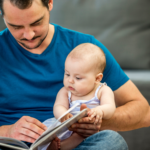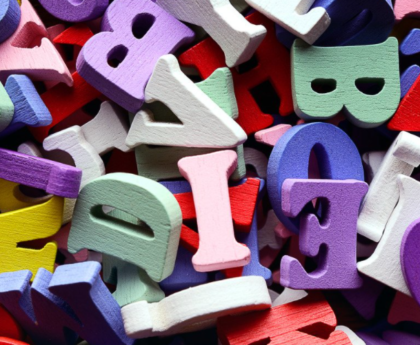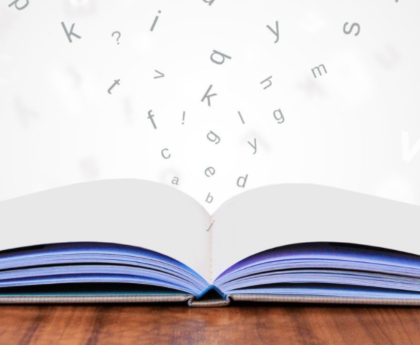Literacy—the ability to read, write, and utilize language—begins developing early in life.
Infants naturally respond to oral expression and language around them. Babies learn to communicate verbally and eventually say their first words by repeating what they hear. Toddlers start using words, forming sentences, building a vocabulary, and recognizing the importance of print in their environment.
These are called pre-literacy skills, all of which are important for learning to read.
Although speaking comes naturally to young children, reading must be explicitly modeled and taught. To help your toddler catch on to the joy of reading, here are some things you can do.
The Importance of Early Reading for Toddlers
Toddler years are an important time during development. During this time, your toddler is building foundational skills required for reading. Before your child enters preschool or kindergarten, their early literacy development is heavily influenced by their reading experiences with trusted adults.
Scientifically, it’s been found that when parents or family members read to their children, it enhances language development. The attitude with which you approach reading and storytime can also impact your child’s perspective of reading.
Equally as important, the types of experiences a child has with books and stories can set the stage for his or her attitude toward reading. To make these early literacy experiences fun, engaging, and empowering for your child, prioritize the following activities.
Age-Appropriate Reading Activities to Inspire Literacy
Toddlers are still developing their attention skills and are not expected to start reading right away. Regarding literacy, kids learn best at this stage through storytime, playing together, laughing, and day-to-day moments. Choosing activities that engage their curious, playful minds is key.
Interactive Storytime
Having a daily storytime routine is a great way to instill a fondness for reading in your child. Reading to your child is both helpful to their development and beneficial to your relationship. It fosters a close bond between parent and child.
When you read with your toddler, encourage them to be involved:
- Let them turn the pages
- Let them point at pictures and talk about what’s going on in the story
- Take turns asking questions about the book
- Praise your child if they make interesting connections in the story or predict what’s going to happen next
- Match your toddler’s excitement if they request to read a book more than once during storytime
- Be intentional about reading books about topics your child likes
- Encourage your child to choose the book for you to read together
Reading with your child also allows you to model important literacy skills such as listening, fluency, comprehension, and identifying different parts of a book.
Reading Through Play
Young children learn best through play! Whether it be reading, playing with toy letters, scribbling “notes” during imaginative play, or making up exciting stories, early literacy experiences can (and should) be a lot of fun.
Include activities that facilitate reading and literacy during play. Play games that give your child good feelings about reading and writing. They’ll be able to carry these feelings with them on their learning journey.
Literacy-focused activities don’t always have to involve reading to your child. You can “read through play” as your toddler tells you their own stories, acts out their favorite narratives, and makes up a new story while flipping through the pages of a book. These are all good signs your child is taking an interest in the world of literacy.
Building Vocabulary
Help your child build their vocabulary day by day with some practical tips you can use anywhere, any time.
Talk with your child. Use new words in context during conversations your toddler is involved in. Include your toddler in family dialogue and offer an age-appropriate description if they ask, “What’s that?” Clearly say names and words out loud when they point curiously at people or items.
When children are toddlers, you don’t need to point out speech mistakes or correct their grammar. You also shouldn’t overreact when another person doesn’t understand what your toddler is saying. Instead of prompting your toddler to repeat their sentences “correctly,” you can be a helper in the situation and translate for the other person. If you repeatedly criticize or over-correct your toddler as they learn new words, they may become discouraged and avoid new words.
Noticing the Print Around You
Print is all around you and your toddler, whether at home or out in the world. Concepts of print is an important aspect of early literacy where your child begins to recognize symbols, signs, and various print materials that contain meaning.
You can make a game out of environmental print by pointing out signs, names, kids’ brands, and more. Celebrate when your child “reads” books, magazines, menus, signs, and other forms of print.
Engaging Learning Apps
Children today are digital natives, meaning from the time they’re born they interact with various forms of technology. Toddlers can benefit from learning apps that are evidence-based, skill-level appropriate, and parent-supervised.
Fun and interactive learning apps can support the early literacy skills your toddler needs to build upon. Plus, trusted reading apps are a personalized way to help your child enjoy reading activities at home or on the go. As your toddler learns, they can gradually play more advanced games in the app. As a parent, you can make digital reading activities a bonding experience and guide your child to each new level.
Get Involved in Your Toddler’s Reading Development
Overall, the best thing you can do for your child is to make many of their early literacy experiences shared experiences. Through daily moments, fun games, special activities, and educational apps, your involvement can motivate your child on their journey toward becoming a skilled reader.
To help your toddler gain the skills and attitudes that will equip them for life, explore the reading.com platform today!





